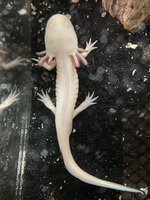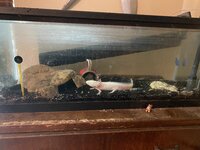The little axolotl
New member
Hello, I am very worried about my axie who I love dearly. I have made 1 other post about this before, but no one has responded and it is outdated. I have a ~4 year old male axolotl in a 20 gallon long aquarium with a canister filter, airstone, cave, etc. his tank temperature used to be a bit high but I have been able to keep it around 65 or so degrees Fahrenheit. I am usually on top of water changes, but I have been very stressed myself and will occasionally miss a water change. The problem started months ago near the end of 2021. He was refusing food, but I thought the issue would resolve its self. It did not. He is now incredibly underweight, with his torso only being around 1/3 to 1/2 the width of his head at the widest. It should be noted that I raised him up from when he was around 3 inches, (he is now fully grown at about 10, and he used to be quite healthy looking) and I never had any problems until semi recently. I have no idea what is causing it. I reduced the flow because that used to be a bit high, I fixed his temperature problems, I tried different foods, including hikari sinking carnivore pellets, red wrigglers, and Canadian night crawlers, but I couldn’t get him to eat. He would put them in his mouth and spit them out instantly. I had some success mixing his worms with some thawed bloodworms, but today I noticed him heaving and then throwing up. I checked his water conditions, and the ammonia and nitrites were at 0, nitrates at 20, and the pH and hardness were high but they always has been, I have very acidic and hard water. It should be noted that I did the ammonia test with a liquid test kit, but the rest was done with test strips because that is what I have. I am incredibly worried, I have seen him swimming around his tank frantically and snapping at nothing or at his legs and tail. I don’t know what I am doing wrong, and exotic vets are expensive. I am going to find out tomorrow if there are any vets in my area that take axolotls, which is another thing. Even if I do bring him in, I don’t know what they could do to help him. I haven’t introduced anything new to the tank recently that I can think of. I am going on vacation with my family next month, and we will be gone for 2 weeks. I don’t think person we have taking care of him will spend all the necessary time on him, so I am also worried about that. Should I give him salt baths? Tea baths? Please help us, and thank you all in advance.
Last edited:



